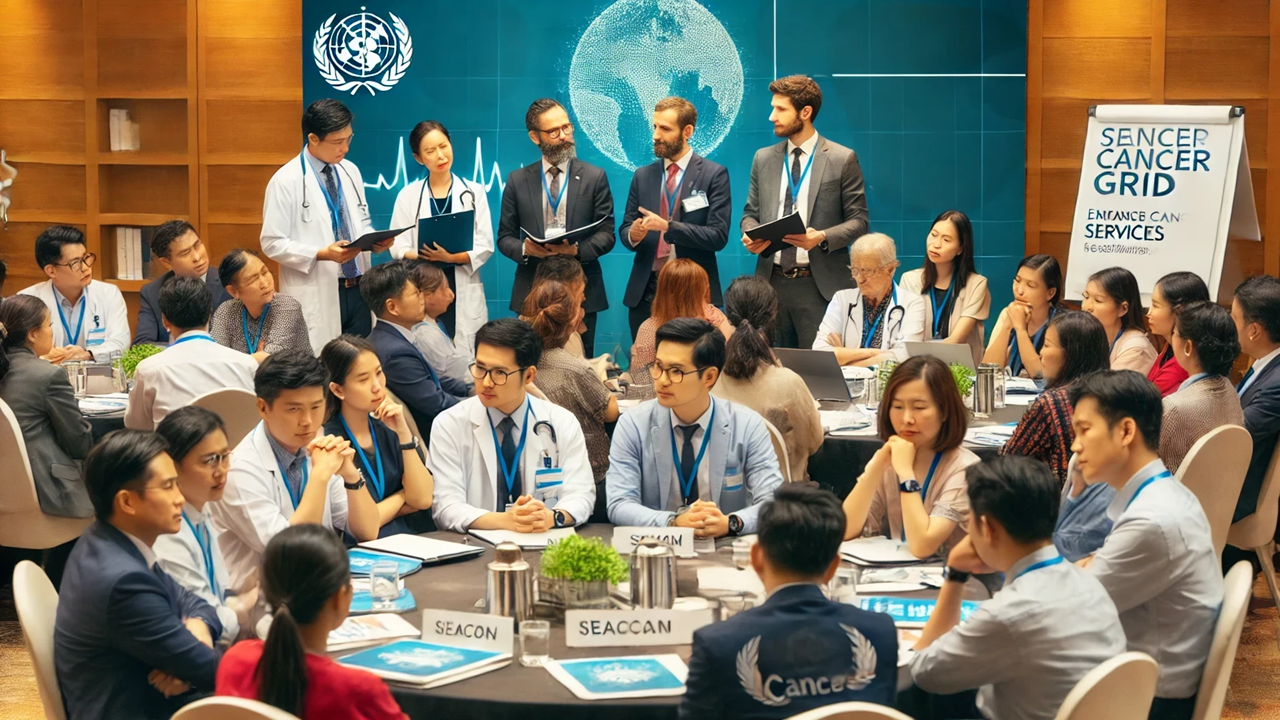South-East Asia's Battle Against Cancer: A United Front for a Healthier Future
The WHO South-East Asia Regional Workshop, held in Kathmandu, Nepal, from May 14-17, 2024, focused on enhancing cancer services and implementing the South-East Asia Cancer Grid (SEACanGrid). The workshop aimed to identify strengths and limitations in current cancer services, foster technical collaboration, develop sustainable financing models, and expand cancer registry coverage. Key discussions included strategic priorities for 2030, country-specific cancer control plans, and core themes for future directions. The workshop emphasized the importance of early diagnosis, quality treatment, palliative care, and human resource development to reduce the cancer burden in the region.

In a concerted effort to address the escalating cancer crisis, the WHO South-East Asia Regional Workshop convened in Kathmandu, Nepal, from May 14-17, 2024. This crucial gathering brought together policymakers, healthcare professionals, and international experts to strategize on enhancing cancer services across the region. With a staggering 2.4 million new cancer cases reported in 2022, including 56,000 children, and projections indicating an 85% increase by 2050, the urgency to act has never been greater.
A Collaborative Approach to Cancer Control
The workshop aimed to achieve several key objectives, including identifying strengths and limitations in current cancer services, fostering technical collaboration through the South-East Asia Cancer Grid (SEACanGrid), developing sustainable financing models, and expanding cancer registry coverage. These efforts are crucial for improving early diagnosis, treatment, and palliative care, thereby reducing the overall cancer burden.
Strategic Discussions and Initiatives
During the workshop, participants delved into various aspects of cancer control. The inaugural session underscored the importance of prioritizing HPV vaccination, early diagnosis, and scaling up quality treatment and palliative care. The status of cancer control in the region was reviewed, highlighting notable efforts in HPV vaccination, tobacco control, and the establishment of cancer registries.
One of the significant discussions centered around the strategic priorities for 2030, presented by Dr. Nalika Gunawardena. The strategy includes formulating robust national cancer control plans, strengthening prevention policies, prioritizing early diagnosis, enhancing cancer management capacity, improving access to supportive care, and fostering partnerships.
Country-Specific Plans: Tailored Strategies for Unique Challenges
The workshop provided a platform for countries to present their specific cancer control plans and challenges. Bangladesh focused on forming a steering committee, developing a national strategy, establishing uniform treatment standards, and improving diagnostic capacity. Bhutan prioritized strengthening cancer registries, integrating screening services into routine healthcare, and establishing shared care networks for childhood cancer. India emphasized a holistic approach with pillars on cancer information management, sustained budgetary support, and affordable cancer care, including HPV vaccination and screening incentives. Indonesia aimed to develop a comprehensive national cancer control plan, focusing on governance, tobacco-free initiatives, cancer registry, and palliative care. Maldives planned to strengthen screening programs, and diagnostic services through public-private partnerships, and establish multidisciplinary tumor boards and telemedicine services. Myanmar focused on cervical, breast, and childhood cancer, implementing screening programs, and sustaining population-based cancer registries. Nepal aimed to increase population-based cancer registry coverage, achieve HPV vaccination targets, and expand shared care centers for childhood cancer. Sri Lanka developed plans for cervical cancer elimination, increasing screening and treatment coverage, and strengthening palliative care services. Thailand is drafting the next version of NCCP, focusing on comprehensive cancer care, expanding HPV DNA-based screening, and utilizing internal resources for implementation. Timor Leste planned to strengthen the national cancer registry, prioritize cervical and breast cancer policies, and build capacity in pathology, medical oncology, and radiotherapy.
Core Themes and Future Directions
The workshop concluded with the identification of core themes and next steps. Prioritization of high-value interventions based on disease burden and resource availability was emphasized. Population-based cervical cancer screening and early diagnosis for other cancers in resource-limited settings were recommended. The importance of comprehensive cancer centers, equitable access to treatment, and financial protection measures was highlighted. Integrating palliative care into primary health care and addressing mental health needs were also crucial aspects.
Human resource development was deemed vital, with a focus on multidisciplinary expertise and efficient resource utilization. Collaboration and innovation were encouraged, leveraging networks like SEACanGrid for technical capacity building and innovative financing approaches for cancer services.
Path Forward
The WHO South-East Asia Regional Workshop underscored the urgent need for coordinated efforts to scale up cancer services in the region. By addressing gaps in screening, diagnosis, treatment, and palliative care, and fostering collaboration through SEACanGrid, significant strides can be made towards reducing the cancer burden and improving patient outcomes.
- FIRST PUBLISHED IN:
- Devdiscourse
ALSO READ
WHO Raises Alarm Over Health Crisis in Occupied Palestinian Territory Amid Increased Violence and Restrictions
WHO Report Highlights Urgent Need for Innovative Antibacterial Agents Amid Rising AMR Threat
Will never go with those who tried to finish off Shiv Sena: Uddhav Thackeray on speculation that he will align with BJP.
WHO Global Patient Safety Report 2024 Highlights Progress in Enhancing Healthcare Safety
TN CM announces Rs 10 lakh assistance to each of families of 34 persons who died after consuming illicit arrack.










